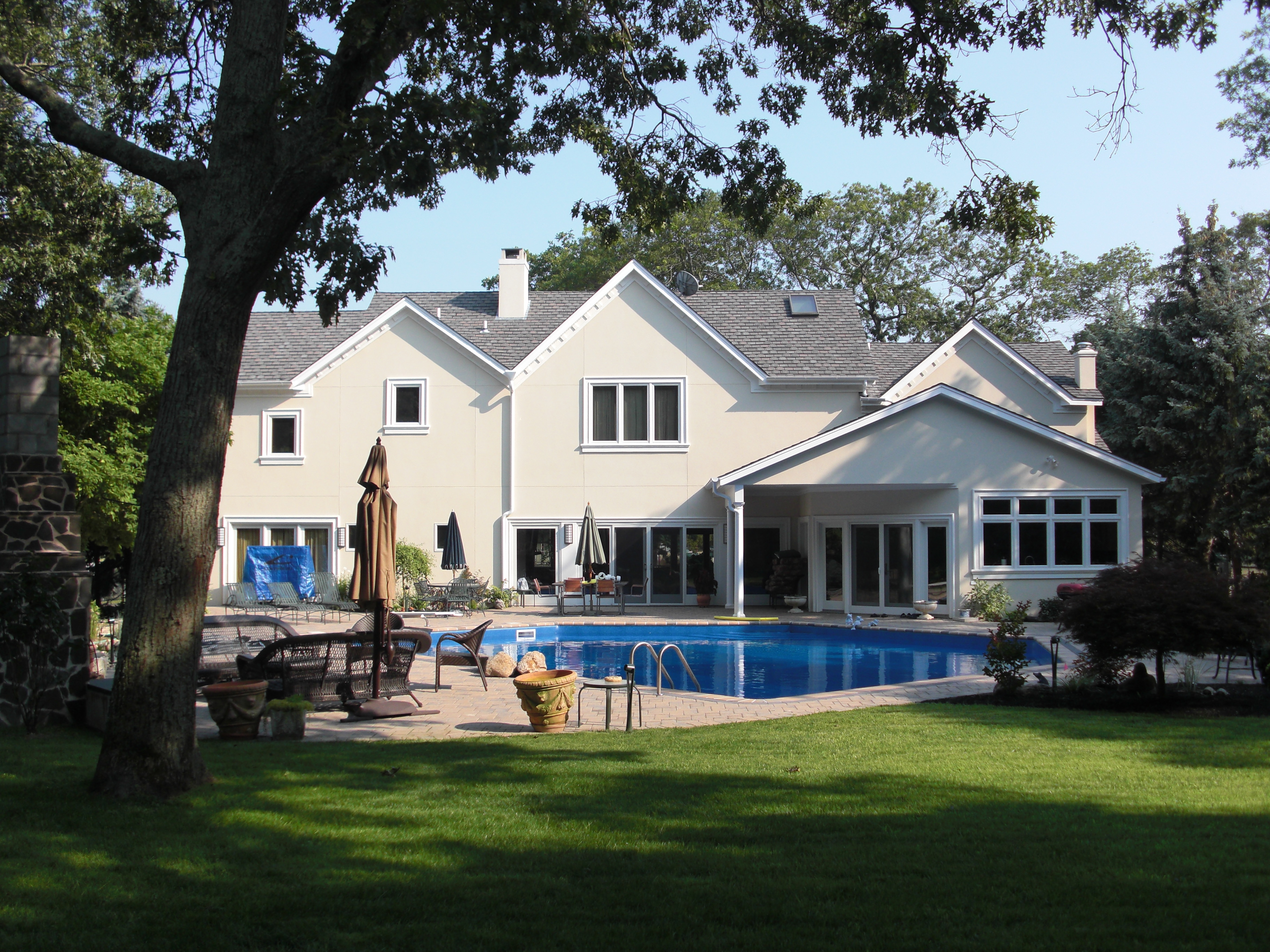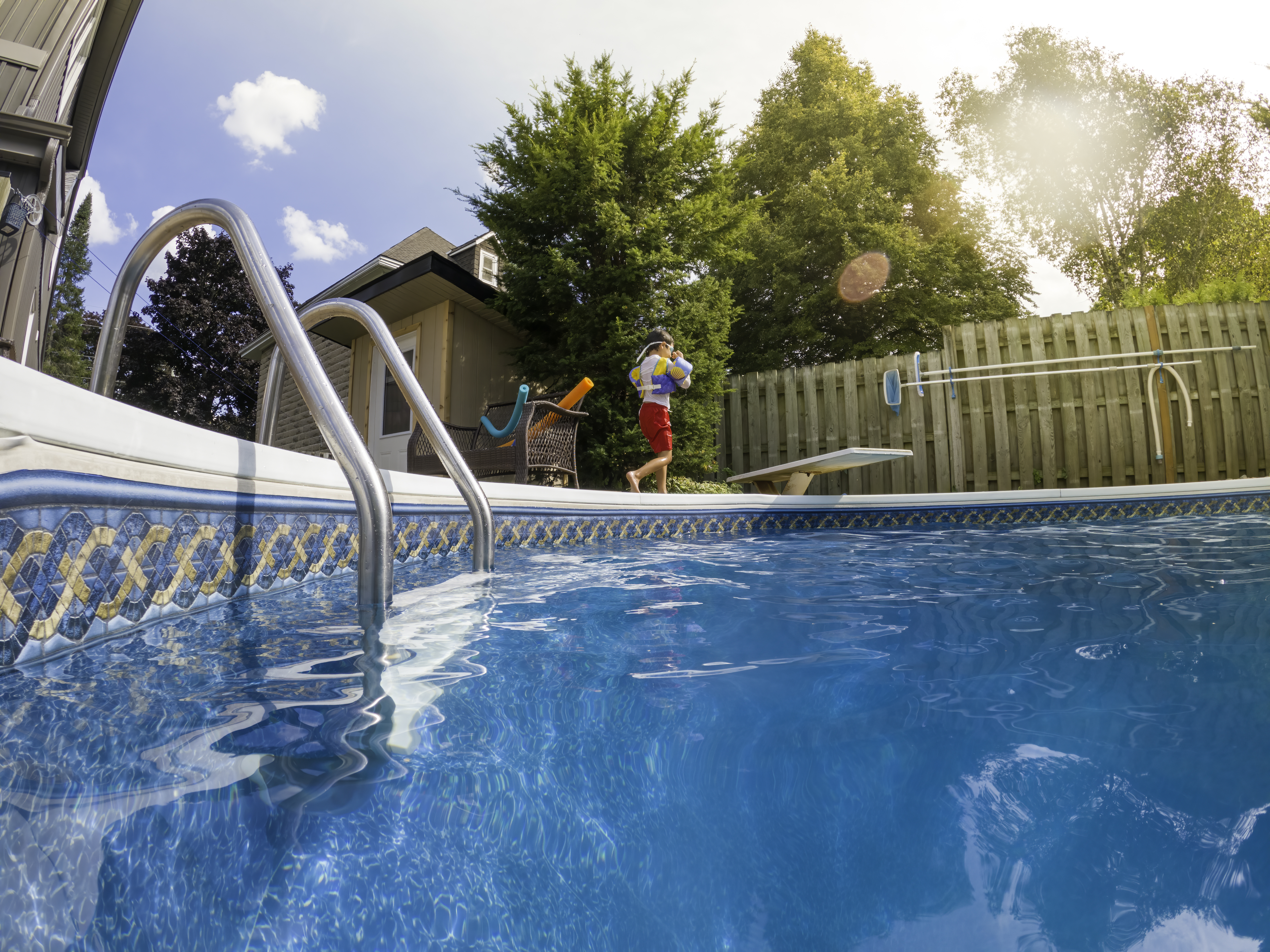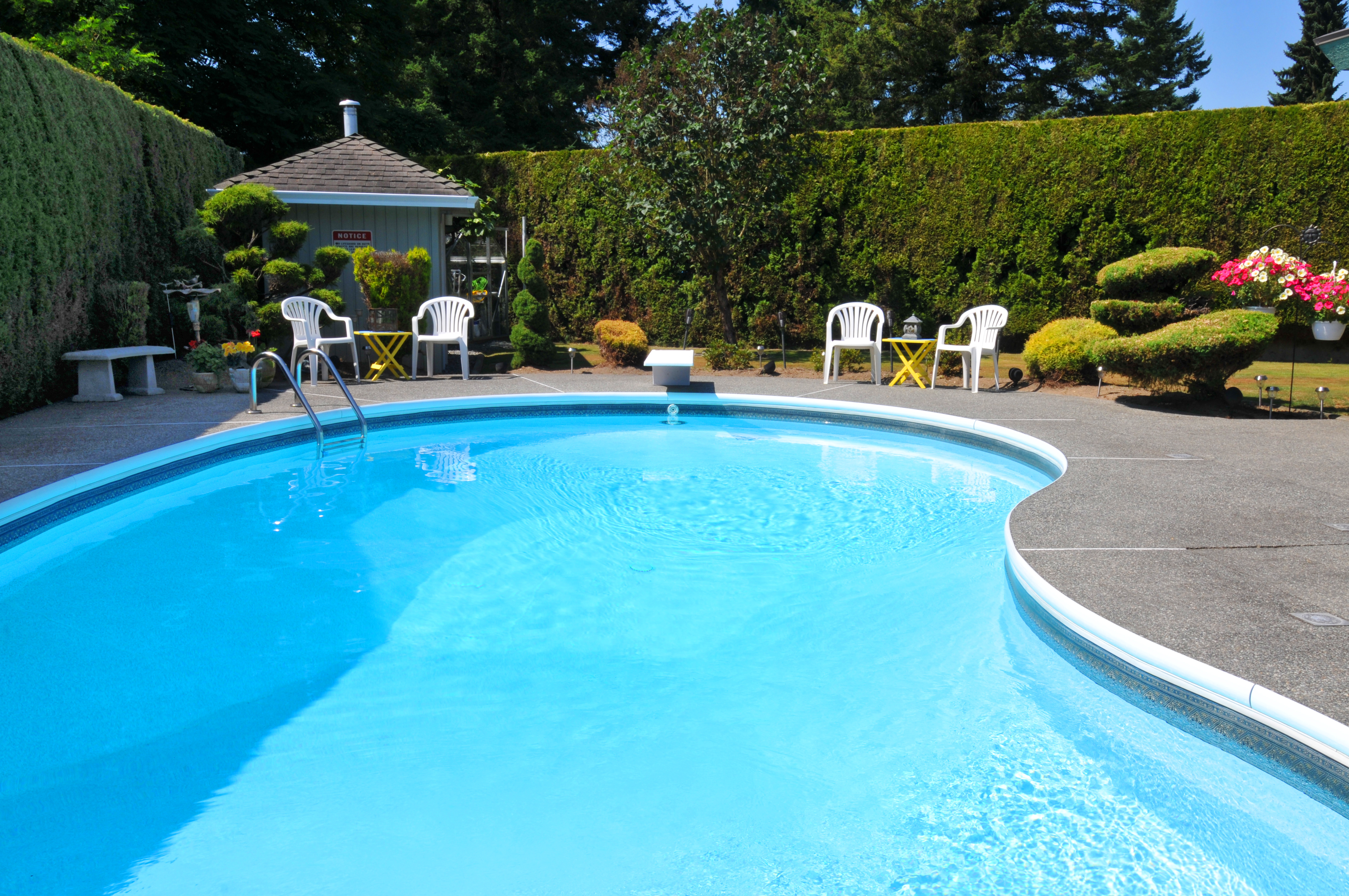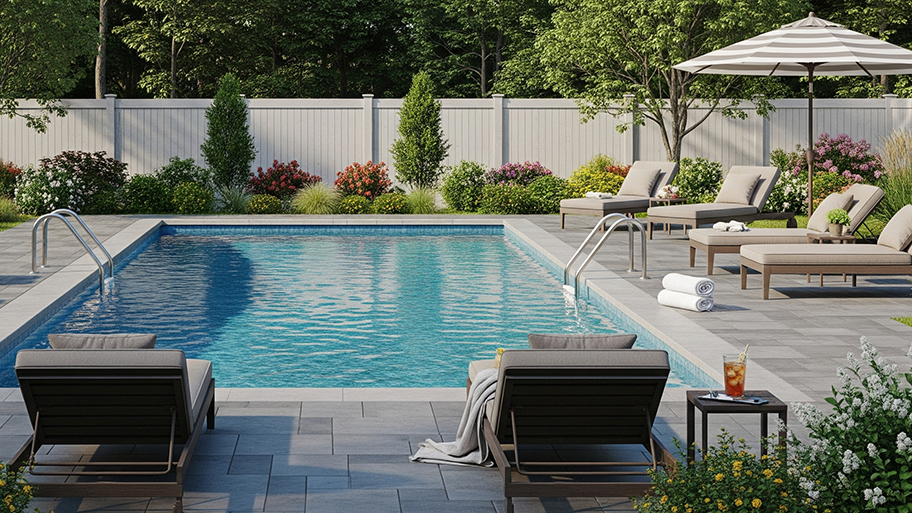
An inground pool offers endless fun in the summer, so if you're considering it for your home, read up on average inground pool costs in New York.
The cost of a pool filter ranges from $500 to $2,500, with most homeowners paying between $500 and $2,000. Your price depends on filter type, pool size, and installation complexity.


Pool filter installation involves selecting and fitting the right filtration system to keep your pool water clean and safe.
The main cost factors for pool filters are the type of filter you choose, your pool’s size, and the complexity of the installation.
Contractors charge service fees of between $100 and $250 to install a pool filter, with hourly rates between $60 and $125.
Upgrading to a modern, efficient filter system can boost pool performance and may improve your home’s value.
Properly installed and maintained filters help reduce long-term maintenance costs and minimize water quality issues.
This article was created using automation technology and thoroughly fact-checked and edited by an Angi Editor in accordance with our AI policy.
The average cost of a pool filter is $1,350, with most homeowners spending between $500 and $2,000 on installation. The final price depends on the filter type, pool size, and whether you choose professional installation. Cartridge, sand, and DE filters each have unique costs and maintenance needs. Choosing the right filter helps keep your pool safe, efficient, and enjoyable for years to come.
Choosing the correct filter size for your pool is essential for both performance and cost. The larger the pool, the bigger the filter you’ll need, which impacts both upfront and ongoing expenses. Undersized or oversized filters can lead to higher costs or inefficient operation.
Pool size, measured in gallons, determines the capacity of the filter you need. Most residential pools require filters sized for 10,000 to 30,000 gallons. A filter that’s too small will struggle to keep water clean, while an oversized filter may lead to unnecessary expense without added benefit.
| Filter Size (Gallons) | Recommended Pool Size | Average Cost Range |
|---|---|---|
| Up to 10,000 | Small (spas, small above-ground) | $500–$900 |
| 10,000–20,000 | Medium (average in-ground) | $900–$1,500 |
| 20,000–30,000 | Large (luxury/resort-style) | $1,200–$2,000 |
| Over 30,000 | Extra-large/commercial | $1,800–$2,500 |
The type of pool filter you select has a major impact on both upfront and long-term costs. Each filter type comes with unique maintenance needs, replacement schedules, and performance benefits. Let’s look at the main options.
There are three main types of pool filters: sand, cartridge, and diatomaceous earth (DE). Each has its own cost structure, maintenance frequency, and suitability for different pool types. It’s important to weigh the pros and cons of each to find the best fit for your needs.
| Filter Type | Average Unit Cost | Installed Cost | Pros | Cons |
|---|---|---|---|---|
| Sand | $250–$600 | $500–$1,200 | Easy to maintain, affordable | Less effective at fine particle removal |
| Cartridge | $300–$900 | $700–$1,600 | Efficient, easy-to-replace cartridges | Cartridges need frequent replacement |
| DE (Diatomaceous earth) | $400–$1,200 | $1,200–$2,500 | Best filtration, clear water | Higher maintenance, more expensive |
Sand filters are budget-friendly and simple to maintain, but offer less precise filtration. Cartridge filters offer a balance of cost and performance, while DE filters provide the cleanest water but at a higher price and maintenance level.
Some pools require specialty filters:
Saltwater-compatible filters cost more due to corrosion-resistant materials, often adding $100 to $400 to the price.
High-capacity or commercial-grade filters for large residential pools can exceed $2,000 for equipment alone.
Smart or automated filter systems, which allow remote monitoring and control, can add $500 or more to the total pool filter cost.
Brand reputation and warranty coverage can also affect the cost of a pool filter. Well-known brands like Hayward, Pentair, and Jandy offer models ranging from $500 to $2,500. Filters with longer warranties or advanced features come at a premium, but may offer better value in the long run by reducing replacement frequency and maintenance hassles.
The location of your home and where you install your filter can influence your total pool filter cost. Labor rates, supply availability, and even climate can affect pricing.
Labor and material costs vary widely between regions. Urban areas often have higher labor rates, while rural regions may have lower rates but less access to specialized equipment or contractors. Local demand and the number of available pool professionals can also impact your final price.
Above-ground pool filters are less expensive to install than in-ground models. In-ground pool filters may require more complex plumbing and electrical work. Accessibility—such as tight spaces, long distances from the pool, or installations for second-story or indoor pools—can increase labor time and cost. Expect to pay more if your installation site is difficult to reach or needs additional modifications.
Several factors influence the total pool filter cost beyond just the filter itself. Let’s break down the main cost drivers.
Pool filters are installed by pool contractors, plumbers, or experienced handypersons. Minimum service fees range from $100 to $250, with hourly labor rates between $60 and $125, depending on your location.
Labor includes removing the old filter, connecting plumbing, performing necessary electrical work, and testing the system. Complex plumbing, electrical upgrades, or hard-to-reach locations will increase labor costs.
Some municipalities require permits for pool filter installation or replacement, especially if electrical or plumbing systems are modified. Permit fees range from $50 to $200, depending on your region. Inspections may be required, which can add to the cost. Failing to obtain permits can result in fines or issues with home insurance.
Optional add-ons such as filter timers, automation, remote monitoring, and pressure gauges can increase your pool filter cost by $100 to $500 or more. Integrating your filter with a smart pool system or upgrading plumbing and electrical for advanced features will also add to your final price.
Several additional factors can influence the cost of pool filter installation, including:
Project complexity—such as rerouting plumbing, upgrading electrical systems, or custom installations—can drive up costs.
Hard-to-reach filter locations or landscaping obstacles may require extra labor.
Site preparation, including removing the old filter and delivering new equipment, can result in disposal fees of $50 to $150.
Post-installation cleanup and debris removal, as well as design or consultation fees for custom systems, should be factored into your budget.
Inspection costs for code compliance or warranty validation can add another $50 to $200.
In addition to installation, several ongoing costs and considerations can affect your total pool filter cost.
Most pool filters come with a manufacturer's warranty of one to three years, included in the purchase price. Extended warranty plans, which may cover parts and labor for up to five years, can cost an additional $100 to $300. Warranties can influence whether you repair or replace a filter, as covered repairs are less expensive.
Operating costs include the energy needed to run the pool pump and the price of replacement filter media:
Sand filters require new sand every five to seven years, costing $50 to $150.
Cartridge filters typically require new cartridges every one to three years, costing between $100 and $300.
DE filters require regular DE powder replenishment, costing $50 to $120 per year.
Annual energy costs vary by filter type and pump efficiency, ranging from $100 to $400.
Routine maintenance is necessary to keep your filter working efficiently. Sand filters need backwashing every few weeks, cartridge filters require cleaning several times per season, and DE filters need periodic recharging.
DIY maintenance supplies can cost $50 to $200 annually, while professional maintenance services may cost $100 to $350 per year. Filter media replacement intervals and associated costs depend on the filter type and pool use.
Sales tax on pool filter purchase and installation depends on your state or local tax rate, which can range from 5% to over 10%. In some regions, labor may be taxed as well as materials.
Upgrading your pool filter may affect your homeowner’s insurance premium, especially if your insurer requires specific pool equipment for coverage. Some policies require proof of compliant filtration for liability purposes. Coverage for filter-related water damage or failures depends on your policy, so check with your agent before making upgrades.
You can save on labor by installing a pool filter yourself, but there are important trade-offs to consider.
DIY pool filter cost includes only the price of the filter, basic plumbing supplies, and disposal of old equipment— totaling $500 to $1,200. By doing the work yourself, you avoid labor costs, but hidden expenses like tool rental ($25 to $75) or unexpected repairs can arise.
Installing a pool filter yourself requires basic plumbing and electrical skills. You’ll need pipe cutters, wrenches, PVC glue, Teflon tape, and potentially a multimeter for electrical connections. The installation process can take two to six hours, depending on your experience and the complexity of your pool system.
DIY installation carries risks. Mistakes can cause leaks, poor water quality, or void your warranty. Incorrect installation may violate local codes, leading to fines or costly corrections. Safety concerns, particularly with electrical connections, should not be taken lightly.
Professional installation is strongly recommended for in-ground pools, advanced filter systems, or when electrical work is required. A local pool service pro ensures your filter is installed safely, up to code, and maintains the manufacturer’s warranty. For complex or high-end systems, the peace of mind is often worth the added cost.
Deciding whether to repair or replace a pool filter depends on the age, condition, and repair costs.
Common signs your filter needs repair include leaks, high pressure, and poor water clarity. Repairs such as gasket replacement, valve repair, or media replacement cost $100 to $400. If your filter is over seven years old or requires frequent repairs, replacement is the better investment.
Average repair costs for common filter issues range from $100 to $400. If repair costs exceed 50% of the price of a new filter, replacement is more cost-effective. Warranty status can make repair a better option if parts and labor are covered.
Upgrading to a different filter type may require plumbing or equipment modifications, which can add $200 to $600 to your pool filter cost. Consider both the upfront and long-term maintenance costs when switching filter types.
Investing in a new or upgraded pool filter can provide both direct and indirect value for your property.
A new pool filter can increase your home’s value by improving water quality, safety, and energy efficiency. Homes with well-maintained pools are more appealing to buyers and may command higher prices. Compared to other pool upgrades, a modern filter system offers a strong return on investment by reducing ongoing maintenance and repair costs.
Consider the following tips to keep your pool filter costs within budget:
Shop for filters during off-peak seasons for better pricing.
Compare multiple quotes from local pool professionals.
Choose the right filter size and type for your pool to avoid overspending.
Perform routine maintenance to extend filter lifespan.
Consider DIY maintenance tasks to save on service fees.
Reuse or recycle old filter components when possible.
Bundle filter installation with other pool upgrades for potential discounts.
Home is the most important place on earth, which is why Angi has helped more than 150 million homeowners transform their houses into homes they adore. To help homeowners with their next project, Angi provides readers with the most accurate cost data and upholds strict editorial standards. We extensively research project costs to develop the pricing data you see, so you can make the best decisions for you and your home. We rely on reputable sources, including the U.S. Bureau of Labor Statistics, academic journals, market studies, and interviews with industry experts—all to ensure our prices reflect real-world projects.
Want to help us improve our cost data? Send us a recent project quote to [email protected]. Quotes and personal information will not be shared publicly.
From average costs to expert advice, get all the answers you need to get your job done.

An inground pool offers endless fun in the summer, so if you're considering it for your home, read up on average inground pool costs in New York.

Regular pool liner replacements are key to a properly maintained pool. Find out the average cost of pool liner replacement in New York City.

A pool remodel can bring new life to your yard. Weigh the average pool remodel costs in New York so you can plan accordingly.

Discover the cost to install a solar pool heater, including average prices, key cost factors, and tips to save on your project.

If your water has high calcium hardness, it's important to learn how to lower calcium hardness in your pool water to avoid corrosion that can harm your pool's plumbing.

Everything was going swimmingly, but now your pool heater is not working properly. Here are some troubleshooting tips to get you back in business.